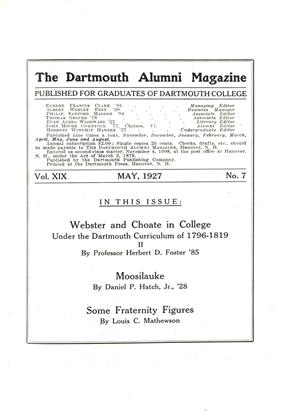(From The Buffalo (N.Y.) News)
With the idea of reforming intercollegiate football, Dr. Hopkins, president of Dartmouth college, advocates limiting it to sophomores and juniors, holding big games on a reciprocal or doubleheader basis, with each college playing one eleven on the home field and another eleven on the field of the rival college and restricting all coaching to undergraduates.
The adoption of these suggestions he believes would open participation to a larger number of men, would lessen the disruption of college work now caused by concentration of attention on one big game and would eliminate the evils that sometimes attend professional coaching.
Dr. Hopkins likes football and seeks to preserve its values. As affairs connected with it are now ordered, he fears that it soon will be exalted to its ruin by uncomprehensive forces outside the college life." In his opinion, conditions with respect to it have reached a point where if its friends do not seek to set matters right, its foes will find justification "for de manding and accomplishing its death." So he urges a conference of representatives of the colleges and universities to consider his proposals for reform.
There is general agreement among educators that intercollegiate football is overemphasized and commercialized, that it has got out of its proper relationship with other aspects of college life. In some places the influence of the game has become greater than all else having to do with college. It has gone beyond the .point of being a game and has become a great commercial spectacle.
Competitive athletics in schools and universities are valuable for their physical effects and for their socializing influences. They should always be kept subordinate to studies. Football has got out of bounds. It has been magnified and glorified out of all proportion to its true place in the scheme of things. This is owing in some measure to the fact that coaches and trainers depend upon victory for their living.
It does not fit in with the American idea of things to take athletics in quite so casual a way as one is led to believe they are taken in the British universities. This is not to say that the Britisher is any less keen to win than the next man, but he is not so intense in his methods. This is the testimony of American men at English universities. Football stars from American colleges, taking up the game as played at Oxford and Cambridge, say that there is a great difference in spirit on the fields here and there. The spirit of "the game for the game's sake" is not enough in evidence in this country. It should be the concern of college and university authorities to foster that spirit. Such a conference as Dr. Hopkins proposes holds out some promise of such a development.
 View Full Issue
View Full Issue
More From This Issue
-
 Article
ArticleWEBSTER AND CHOATE IN COLLEGE
May 1927 By Herbert Darling Foster '85 -
 Article
ArticleTHE UNDERGRADUATE CHAIR
May 1927 -
 Article
ArticleMOOSILAUKE
May 1927 By Daniel P. Hatch, Jr. '28 -
 Article
ArticleSOME FRATERNITY FIGURES
May 1927 By Louis C. Mathewson -
 Article
ArticleDARTMOUTH STUDENTS SAID TO BE IRRELIGIOUS
May 1927 -
 Class Notes
Class NotesClass of 1921
May 1927 By Herrick Brown







